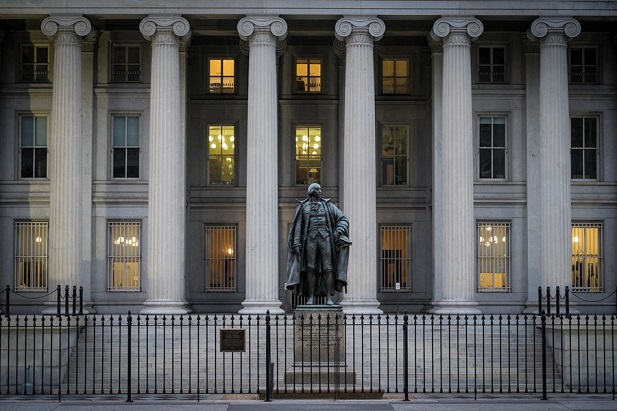Will Treasury deliver coronavirus relief for safe harbor plans?
After financial crisis, 30-day notice requirement of suspended matches was waived -- but no mention in CARES Act.

Critical relief for sponsors of safe harbor retirement plans was not included in the CARES Act, which was signed into law last Friday. Safe Harbor plans allow sponsors to avoid many annual compliance testing requirements and are designed to ensure that plans don’t fail so-called top-heavy and non-discrimination rules by balancing the flow of retirement benefits between highly compensated and rank-and-file employees.
To get the latitude of safe harbor plan status, employers have to pay via one of three matching options:
- a non-elective, immediately vested contribution of 3 percent even if employees don’t contribute;
- a basic match of 100 percent of employees’ first 3 percent contribution, and 50 percent of their next 2 percent;
- or an enhanced match of 100 percent of the first 4 percent of each employee’s contribution.
30-day notice requirement to reduce or suspend the match
Safe harbor plans are allowed to reduce or suspend matches in times of economic hardship. Clearly, many safe harbor plans already qualify. But in order to suspend its match, the employer must give each participant a 30-day notice before it does.
For some employers, that is critical time that simply can’t be afforded, says Will Hansen, chief government affairs officer for the American Retirement Association.
“A lot of small businesses are having immediate cash flow issues, and facing immediate closure,” said Hansen. “Temporarily suspending a match is a way to free up cash to keep the lights on.”
The ARA is asking the IRS to suspend the 30-day notice requirement. Hansen said the agency has the authority to do so without Congress. In fact, it did so in the wake of the 2008 financial crisis.
The CARES Act created a new coronavirus hardship distribution of up to $100,000 of individual’s accounts, and extended the plan loan threshold to $100,000. The 10 percent fine on both is waived, and the taxes on distributions can be spread over three years of tax filings. It also suspended required minimum distributions for 2020.
That the bill did not suspend the 30-day notice requirement for safe harbor plans was a “surprise” to Geoff Manville, principal, government relations at Mercer.
“It will be discussed in subsequent relief measures,” Manville said.
But that may be too late for some sponsors and businesses, thinks Hansen.
“In the end, we don’t want to see a reduction in retirement account assets, but we definitely don’t want to see plan terminations when a business folds. And that’s what we will get if we don’t see immediate relief,” added Hansen.
The ARA doesn’t have clear data on how many safe harbor sponsors used the option after the financial crisis. Loan activity was relatively low then. But for as bad as the recession in the wake of the 2008 crisis was, it is nothing compared to what most businesses are facing today, said Hansen.
“The 3.3 million in unemployment claims in one week is unprecedented,” he said. “In the end, it’s better for businesses and individuals to survive from a financial standpoint for now, so that down the road we can refocus on saving for a secure retirement.”
Not just for top-heavy plans
Just how many safe harbor retirement plans there are is a hard number to pin down. The IRS does not appear to release that information.
While the Plan Sponsor Council of America’s annual survey of 401(k) plans doesn’t give a total number of safe harbor plans, it does show that both small and large businesses use the option.
“Generally speaking, small plans tend to use the non-matching safe harbor of 3 percent to all eligible employees because small businesses tend to be top-heavy,” said Hattie Greenan, director of research at the PSCA, which is a part of the ARA.
“Larger plans, if they are a safe harbor plan, tend to use the safe-harbor match,” she added. “Safe harbor plan design is not specific to small plans only.”
Last week, the ARA sent a follow-up letter to the Treasury Department, seeking relief from the 30-day notice requirement for safe harbor sponsors.
“The ARA is continuing to receive many questions from our members about concerns relating to retirement plans, especially retirement plans sponsored by small businesses,” the letter said.
“The relief we are requesting is due to the immediate concerns relating to the COVID-19 virus. Many employers are under significant financial burdens and the proposed relief is needed to alleviate these burdens as soon as possible,” it added.
ARA is asking Treasury to allow notice of match suspensions to be made 90 days afterwards.
The organization is also asking for relief from partial termination rules, in light of massive layoffs that could force plans to partially terminate.
“If all non-vested or partially vested plan participants were to become fully vested under (the IRS’s termination rules), plan sponsors would only face further dramatic business hardship due to increased funding costs,” the letter says.
ARA is recommending that Treasury not force plans that have experienced massive layoffs into partial termination status for the remainder of 2020.

